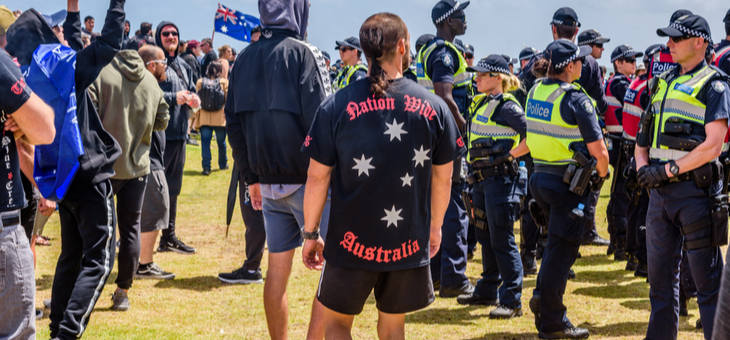Alarming testimony before Parliament’s intelligence and security committee has exposed the risk of extreme right-wing terrorism in Australia.
ASIO director general Mike Burgess has warned that a terrorist attack in Australia remains likely in the next 12 months. Twitter head of public policy Kathleen Reen revealed almost half of all extremists who post on its platform have advocated violence against civilians.
And the Australian Federal Police confirmed that serious threats were made against Labor home affairs spokeswoman Kristina Keneally, whose concerns about far-right extremism led to the inquiry, which is examining all forms of extremism in Australia.
Mr Burgess told the hearing that the terrorist threat level in Australia remained “probable” because of concerns about religiously motivated extremists, and others driven by nationalist and racist views.
“We anticipate there will be a terrorist attack in this country in the next 12 months and it could come from either ideology.
“For me it doesn’t really matter because they are both capable of conducting acts of violence and that’s where we focus.”
Ms Reen said banning contentious discussion from social media platforms would be counter-productive.
“One of the things that’s really important in order to really de-radicalise groups is to make sure that there’s awareness, discussion, interrogation and debate about what the problems actually are.
“Stopping the conversation entirely won’t address the problem in our view – it’ll make it worse.”
Read more: Youth disillusioned with democracy
The New Daily reports that Senator Keneally was the target of “terrible” abuse from neo-Nazi groups after calling out the threat of violence.
“TND has been told security agencies are taking steps to enhance security arrangements around Senator Keneally and other parliamentarians, in response to numerous threats.
“Police have been escorting her to recent public engagements.”
ASIO said right-wing terror made up about 40 per cent of their counter-terror workload, and work on such groups had nearly tripled in the past three years.
In March, Australia listed the UK-based neo-Nazi group Sonnenkrieg Division on its list of banned terrorist organisations, making it the first right-wing terror organisation to be banned in Australia.
Previously, Australia was the only Five Eyes country that had not proscribed a far-right group.
Previously, Islamic extremists and other separatist groups made up the list of more than two dozen banned organisations.
Read more: How prepared is Australia for cyber attacks?
The inquiry is considering whether the listing process for proscribing threatening groups needs an overhaul.
Home affairs deputy secretary Chris Teal said listing an organisation was an important symbolic action, though one that must meet the legislative threshold.
“The ability to proscribe a group is sometimes symbolic in nature and I believe that to be as important as anything else,” he told the hearing.
Under Australian law, the home affairs minister must be satisfied on reasonable grounds that a listed organisation “is directly or indirectly engaged in preparing, planning, assisting or fostering the doing of a terrorist act, or advocates the doing of a terrorist act”.
Mr Burgess agreed that listing an extremist organisation sent a strong message, but it doesn’t stop anyone from committing a violent attack.
“Conversely the absence of a listing does not prevent ASIO from investigating the threat.”
He says the average age of subjects investigated was 25 and they are often well educated, articulate and middle class.
“Young Australians are being ensnared in racist, supremist and misogynist ideologies in a way that is deeply concerning.”
Online safety experts warn that extremists now use dating and gaming sites for recruitment, pandemic-induced isolation having made young Australians an easier target for far-right groups. Children as young as 13 have been ensnared by extremist ideologies.
AFP deputy commissioner Ian McCartney said violent extremists were seeking to “take advantage of isolation, loneliness and financial stress to boost their numbers”.
All representatives from the social media platforms said they would like to see stronger laws in place to curtail the use of hate speech on their platforms, and shared concerns about smaller websites becoming host to extremism.
Are you concerned by the rise of right-wing extremism in Australia? What is your greatest security concern?
Read more: Have governments become too powerful during the pandemic?
If you enjoy our content, don’t keep it to yourself. Share our free eNews with your friends and encourage them to sign up.

